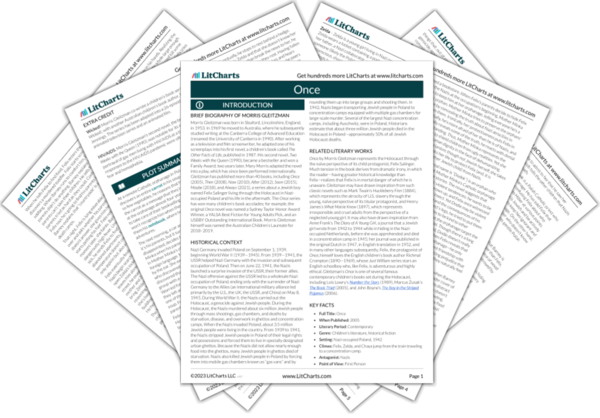Once illustrates how chosen family can be as important as birth family through the story of Felix, a Jewish boy living in Nazi-occupied Poland whose parents have sent him to live at a Catholic orphanage to avoid Nazi persecution. After living at the orphanage for almost four years, Felix develops great affection for the nuns who run the place and for Dodie, a friend he makes there. Nevertheless, he runs away, believing he needs to help his bookkeeper parents save their books from book-burning Nazis. This initial choice—to leave the nuns who have cared for him and the best friend whom he misses terribly—suggests that, at this point, Felix believes ties to one’s birth family supersede bonds with non-family members.
Traveling to find his parents, he stumbles upon a little girl named Zelda lying unconscious next to her murdered parents in their yard; he decides to hide Zelda’s parents’ murder from her until they find his parents, who will take care of her. For much of the novel, Felix and Zelda are motivated by a desire to reunite with their parents—until Felix reveals to Zelda that her parents and dead and realizes that, given the realities of Nazi occupation, his parents likely are too. Later, when Felix looks inside Zelda’s locket and finds a picture of her father wearing a Nazi uniform, he discovers that Zelda’s father was probably a Nazi collaborator killed by the Polish resistance. Nevertheless, Felix refuses to hold the crimes of Zelda’s father against her. Instead, he decides that he is Zelda’s family now, and he continues protecting her even when it puts him in danger and despite Zelda’s biological relationship to a Nazi collaborator. Felix’s choices show that he has realized that his own relationship with Zelda, forged as they protected and cared for one another under threat of Nazi violence, matters more than Zelda’s biological relationship to her birth parents when it comes to understanding who Zelda is—in other words, her father’s Nazi sympathies do not reflect Zelda’s own support of the Nazi regime. Thus, Once recognizes the importance of biological family—Felix’s parents continue to matter to him tremendously even as he extends his affection to others, and even as he confronts the grim reality that they’re likely never coming back for him—while showing that non-biological family can be just as important, loving, and revealing of character.
Family ThemeTracker

Family Quotes in Once
Once I was living in an orphanage in the mountains and I shouldn’t have been and I almost caused a riot.
It was because of the carrot.

Unlock explanations and citation info for this and every other Once quote.
Plus so much more...
Get LitCharts A+At last. Thank you, God, Jesus, Mary, the Pope, and Adolf Hitler. I’ve waited so long for this.
It’s a sign.
This carrot is a sign from Mum and Dad. They’ve sent my favorite vegetable to let me know their problems are finally over. To let me know that after three long years and eight long months things are finally improving for Jewish booksellers. To let me know they’re coming to take me home.
“Jankiel’s not hiding from the men in the car,” says Dodie. “He’s hiding from the torture squad.”
“Sometimes […] parents can’t protect their kids even though they love them more than anything else in the world. Sometimes, even when they try their very hardest, they can’t save them.”
If Zelda’s dad’s a Nazi, does she deserve carrot soup and aspirin?
Yes.
She can’t help what her father did. Plus he’s dead now and so’s her mum and I don’t know if she’s got any other living relatives but after what we’ve been through together that makes me one and I say yes.
“Zelda,” I moan. “Why didn’t you stay?”
“I bit the Nazi,” she says. “Don’t you know anything?”











